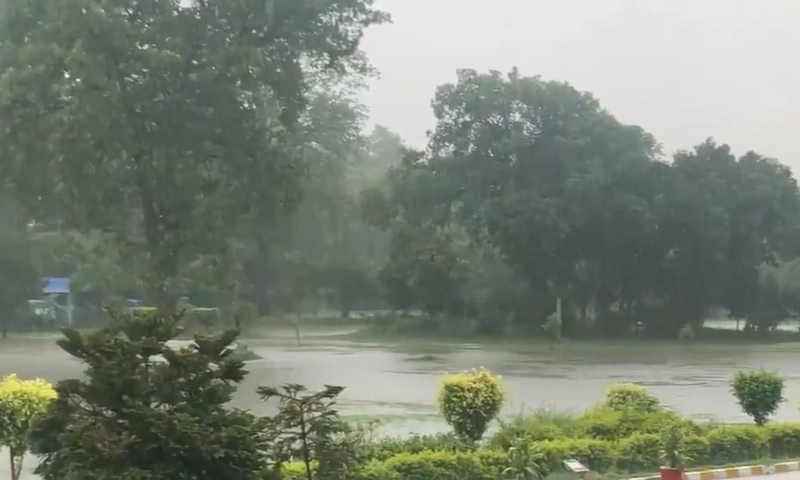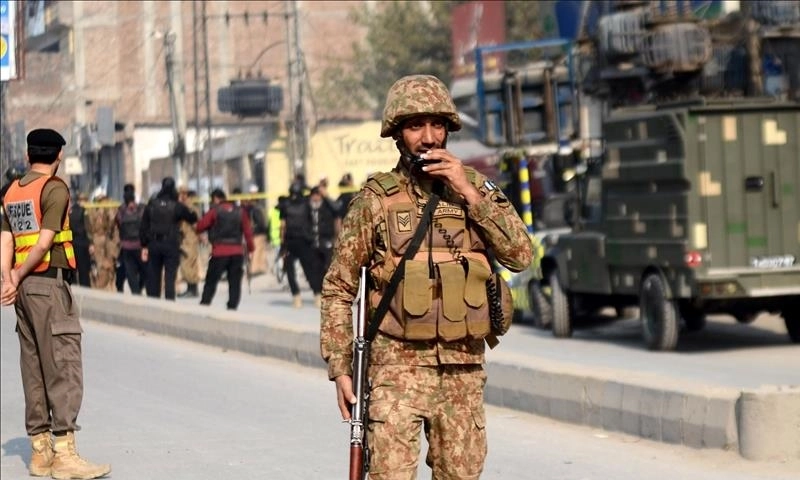- Web Desk
- 48 Minutes ago

Govt faces challenge of securing required votes in NA for constitutional amendment
-

- Web Desk
- Oct 20, 2024

ISLAMABAD: The National Assembly session started late on Sunday night to pass the 26th Constitutional Amendment bill, which had earlier been passed by the Senate with a two-thirds majority.
As the session started, PPP MNA Naveed Qamar presented a motion seeking to suspend the House’s routine proceedings. The motion was approved by the assembly.
Following the approval, the routine proceedings for October 20 and 21 were suspended.
Speaker Ayaz Sadiq is chairing the National Assembly session, where voting on the 26th Constitutional Amendment bill will take place.
Speaker said that the session will be adjourned at 11:55pm and will resume at 12:05 am. The session was adjourned till 12:05 am. The NA session resumed after a break of five minutes.
Earlier, Federal Law Minister Azam Nazeer Tarar presented the motion to introduce the constitutional amendment bill in the National Assembly.
After the break, Azam Nazeer Tarar recalled the 2006 Charter of Democracy agreement, noting that many of its points had been implemented.
He criticized the process behind the 19th Amendment, stating that it was passed under duress and that several key appointments were rejected, with their recommendations disregarded.
Tarar highlighted that PPP Chairman Bilawal Bhutto Zardari, along with others, played a crucial role in the constitutional amendment. He also acknowledged Khursheed Shah’s leadership of the special committee and expressed gratitude to all coalition partners, particularly commending the contributions of Maulana Fazlur Rehman.
Tarar said that the 26th Constitutional Amendment had been passed by the Senate with a two-thirds majority.
Continuing his remarks, the he stated that the parliamentary committee will nominate the chief justice from among the three most senior judges. He added that some amendments were proposed by Jamiat Ulema-e-Islam (JUI) and were supported by the government alliance in the Senate. Additionally, several amendments were made to Article 81.
Pakistan People’s Party (PPP) Chairman Bilawal Bhutto Zardari remarked that Maulana Fazlur Rehman played the most significant role in the passage of the constitutional amendment, acknowledging his contribution after Asif Ali Zardari. He emphasized that Fazlur Rehman’s role in this historic moment will be remembered.
Bilawal said that while his efforts on the bill were significant, Maulana Fazl’s contributions were even greater.
He reminded the assembly that the Charter of Democracy was signed by both Benazir Bhutto and Nawaz Sharif. He stated that whether the opposition votes for the bill or not, it is their right, and either way, it is a political victory for them. He recalled that during the 18th Amendment, they removed the oppressive laws enacted by dictators.
The PPP chairman elaborated that through the 18th Amendment, federal resources were shared with the provinces, and similarly, today they are ensuring equal judicial powers.
He questioned whether the nation had forgotten the history of the judiciary, stating that the role of the courts was to protect democracy and the Constitution and to prevent dictatorship, but instead, they played a leading role in the success of dictatorships.
He reminded the assembly that it was the judiciary that allowed General (retd) Pervez Musharraf to rule the country and even permitted him to contest elections in uniform. He emphasized that the courts were instrumental in the success of dictatorships.
Bilawal also responded to the opposition’s criticisms, referring to their “black snake” remarks, saying that the true “black snake” was former Chief Justice Iftikhar Chaudhry. He criticized the judiciary for failing to deliver justice to their prime minister and for unlawfully stripping them of their authority through unconstitutional measures. He recalled that Quaid-e-Azam Muhammad Ali Jinnah advocated for a constitutional judiciary.
He pointed out that the judiciary dismissed a prime minister for not writing a letter, and that this “black snake” was responsible for the removal of multiple prime ministers. He mentioned that if Justice Durab Patel had taken the oath under the Provisional Constitutional Order (PCO), he would have become the chief justice, noting that even Justice Patel proposed the idea of a constitutional court.
The PPP chairman said that the concept of a constitutional court was not new, as this debate had begun with Quaid-e-Azam Muhammad Ali Jinnah.
PML-N President and former prime ainister Nawaz Sharif arrived at the National Assembly to participate in the session. Upon his arrival, members welcomed him by thumping their desks. Prime Minister Shehbaz Sharif was also present alongside him.
Later, JUI-F Maulana Fazlur Rehman also arrived at the assembly and greeted Nawaz Sharif with a handshake at his seat.
The ruling coalition in the National Assembly requires 224 votes, but currently holds 211 members, o pass the constitutional amendment.
On the government benches, the Pakistan Muslim League-Nawaz (PML-N) has 111 votes, the Pakistan People’s Party (PPP) has 69, the Muttahida Qaumi Movement (MQM) has 22, the Pakistan Muslim League-Quaid-Q (PML-Q) has five, and the IPP has four votes.
There is one member each from the Muslim League Zia, the Balochistan Awami Party (BAP), and National Party.
However, references have been filed against three members of the ruling coalition, bringing the total down to 211. With the support of eight members from Jamiat Ulema-e-Islam-Fazl (JUI), the coalition reaches 219 members. This leaves the government in need of five more votes to pass the constitutional amendment.
On the opposition benches, the Sunni Ittehad Council holds 80 seats, with eight independent members backed by Pakistan Tehreek-e-Insaf (PTI), and one member each from the Balochistan National Party (BNP), Majlis Wahdat-e-Muslimeen (MWM), and Pashtunkhwa Milli Awami Party (PKMAP). The government will need at leat two votes from this group to pass the amendment.
The ruling coalition in the National Assembly requires 224 votes, but currently holds 211 members, o pass the constitutional amendment.
On the government benches, the Pakistan Muslim League-Nawaz (PML-N) has 111 votes, the Pakistan People’s Party (PPP) has 69, the Muttahida Qaumi Movement (MQM) has 22, the Pakistan Muslim League-Quaid-Q (PML-Q) has five, and the IPP has four votes.
There is one member each from the Muslim League Zia, the Balochistan Awami Party (BAP), and National Party.
However, references have been filed against three members of the ruling coalition, bringing the total down to 211. With the support of eight members from Jamiat Ulema-e-Islam-Fazl (JUI), the coalition reaches 219 members. This leaves the government in need of five more votes to pass the constitutional amendment. On the opposition benches, the Sunni Ittehad Council holds 80 seats, with eight independent members backed by Pakistan Tehreek-e-Insaf (PTI), and one member each from the Balochistan National Party (BNP), Majlis Wahdat-e-Muslimeen (MWM), and Pashtunkhwa Milli Awami Party (PKMAP). The government will need at leat two votes from this group to pass the amendment.
Earlier, Pakistan’s Senate passed the 26th Constitutional Amendment bill with a two-thirds majority, approving all 22 clauses in a clause-by-clause vote.
Earlier, Pakistan’s Senate passed the 26th Constitutional Amendment bill with a two-thirds majority, approving all 22 clauses during a clause by clause voting.
Federal Law Minister Azam Nazeer Tarar presented the 26th Constitutional Amendment bill in the Upper House and then moved the motion for a vote, which was approved by a two-thirds majority of the House, with 65 members voting in favour and four against.
Sixty-five members voted in favour of the amendment, including 58 from the ruling coalition, five from Jamiat Ulema-e-Islam-Fazl, and two senators from Balochistan National Party (BNP) Mengal.
Members of Pakistan Tehreek-e-Insaf (PTI) and Majlis Wahdat-e-Muslimeen (MWM) did not participate in the voting process and left the hall to the lobbies.
The Senate initiated the clause-by-clause approval process of the 26th Constitutional Amendment Bill after Chairman Yusuf Raza Gilani ordered the doors of the chamber to be closed. The first clause was approved with a two-thirds majority, as 65 members voted in favour, while four opposed.
Federal Law Minister Azam Nazeer Tarar presented the amendment in the house, stating, “I want to present the 26th constitutional amendment and bring the constitutional amendment bill under consideration in the supplementary agenda.”
He requested the Senate chairman to introduce the amendments as part of the supplementary agenda.
The law minister explained that discussions on the constitutional amendment had taken place, leading to the formation of a committee that included all parliamentary parties, with input from the opposition as well. He also mentioned that the draft had been agreed upon with coalition parties after consultations with the JUI-F.
Following the voting, the constitutional amendment bill was approved by a two-thirds majority.
“Sixty-five members have voted in favour of the bill, while five members have voted against it,” Senate Chairman Gilani announced.





